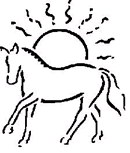 |
Visually
Impaired Riders Are Handicapped Only If There Are No Horses
To Ride In International Competition |
HUNTINGTON,
NY – May 3, 2002 - Close your eyes and picture this: your
wonderfully talented horse, precise in his transitions, follows
the lead of his rider and partner. In less than a week of training
together, they move freely around the dressage arena exhibiting
the finesse of champions. Horses and riders listen for signals
that guide them through the next movement. They track right to
A and counter canter to B. And then you realize with a thrill:
The rider cannot see!
Blind or visually impaired, the only real handicap these equestrians
face is not having a competitive horse to ride in an exciting
new international dressage championship scheduled this summer
on Long Island in New York.
Hopefully, generous horse owners will see the need to make available
sound, trained and fit horses up to Level 4 as mounts for blind
and visually impaired riders, as well as other riders with a disability
competing in the first Inner Vision Championships (IVC) for Riders
with a Disability. The competition will be held July 9-13 at Willow
Tree Farm at Caumsett State Historic Park in Huntington, NY.
Just as horse owners develop partnerships with leading able-bodied
riders, owners can do the same for top riders who have a disability,
according to Denise I. Avolio, chairman of the IVC Organizing
Committee and the Equestrian Sports Manager for the National Disability
Sports Alliance (NDSA).
“We
see owners sharing their talented horses with riders at the upper
levels of competition all the time,” said Avolio. “This
is the same. These riders are top-quality and are very sensitive
to every nuance of a horse’s movement.”
The NDSA is also seeking top quality dressage horses on loan for
the 2003 World Championships and the 2004 Paralympic Games for
riders with disabilities. Other than the 1996 Atlanta Paralympic
Games, the Inner Vision competition will be the first international
championship for riders with disabilities held in this country.
The NDSA, along with Pal-O-Mine Inc., is organizing the Inner
Vision Championships that has attracted competitive riders from
nine nations.
"Borrowed
horses are often used because the sport is still young, and many
of the riders do not yet have the financial support to bring their
own horses to international competitions," Avolio said. "It
would be prohibitively expensive for countries to send teams if
they had to ship horses from abroad as well."
Talented riders from Russia, Japan, Canada, Great Britain, Portugual,
France, Israel and Germany will join those from the United States
for the dressage competition, which has been approved and recognized
by the International Paralympic Equestrian Committee.
The Inner Vision Championships are a special competition for blind
and visually impaired riders who perform dressage tests that are
equal to Level 4 tests for sighted riders. Competing in the same
dressage arena as sighted riders, visually impaired equestrians
may use "living letters" to help navigate their tests.
Trained volunteers call out "A," "B," or their
assigned letter enabling the riders to visualize where they are
in the arena. The aid from “living letters” is the only
concession to their disability.
Adding to the challenge, these equestrians will have less than
a week to practice with their horses before the competition. Unlike
sighted riders, who often train for years on familiar horses,
these visually impaired riders will be allocated horses through
a draw, with only a few days to train on their volunteer mounts.
"It
is truly a challenge for these riders’ skills," said
Lisa Gatti, Competition Manager, acknowledging increased popularity
of competitions for riders with a disability. More horse sport
organizations are initiating these competitions, but quality horses
are needed for these talented riders, she stressed.
"Watching
a horse respond to this challenge, an owner will envision a medal,
but I doubt he has ever experienced such pride," she added.
"We invite horse owners who are willing to loan their competitive
horses for an amazing experience."
Horse owners interested in lending a horse for this very special
event should contact Lisa A. Gatti, Competition Manager, at (631)
423-7183. Anyone interested in sponsorship opportunities or other
ways of supporting the Championships should contact either Lisa
Gatti or Denise Avolio at (914) 949-8166 or diavolio@ndsaonline.org.
The NDSA is that national governing body for equestrian sport
for riders with disabilities. It is responsible for the development
and selection of riders for national championship and international
competitions, including the Paralympic Games, and provides training,
competition and advocacy for riders with physical disabilities.
Pal-O-Mine Equestrian, Inc., is a therapeutic riding program located
in Huntington, NY, that provides therapeutic, recreational and
competitive horseback riding opportunities for people with physical,
emotional and cognitive disabilities.
Both NDSA and Pal-O-Mine are 501(c)3 organizations. Donations
and sponsorships are tax-deductible to the fullest extent allowed
by law.







